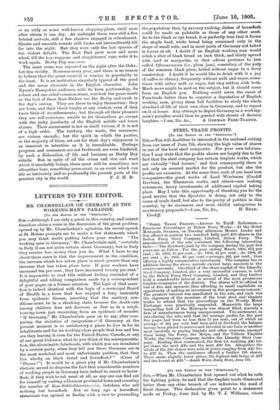[To THE EDITOR Or THE " SPECTAT012."] Sra,—You will doubtless
be interested in the enclosed cutting from our issue of June 7th, showing the high value of shares in one of the local steel companies. For your own informa- tion I may state that the profits shown are largely due to the fact that the steel company has certain tinplate works, which are virtually "tied houses," and that consequently there is not only an assured market for the product, but also the profits are excessive. At the same time, each of our local iron companies—the great works of Lord Wimborne (Cardiff Dowlais), the Blaenavon works, and others—axe making extensions, heavy investments of additional capital taking place. May I take this opportunity of thanking you for the good service that the Spectator is doing, not only to the cause of trade itself, but also to the purity of politics in this country, by its strenuous and most skilful antagonism to reactionary proposals P—I am, Sir, &c., H. READ. Cardiff: "STEEL TRADE PROFITS.—Answer to Tariff Reformers.— Enormous Percentages at Briton Ferry Works.—At the Hotel Metropole, Swansea, on Tuesday afternoon Messrs. Leader and Son offered at auction two hundred fully paid £10 shares in the Briton Ferry Steel Company, Limited, Briton Ferry. The announcement of the sale contained the following interesting facts The dividends paid by the company during the past five years are as follow : For the year ending March, 1901, 674 per cent.; do. 1902, 45 per cent. ; do. 1903, 45 per cent.; do. 1904, 45 per cent. ; do. 1905, 45 per cent.—average, 401 per cent., thus offering a highly remunerative investment. The company has in addition during the above periods carried largo amounts to the reserve accounts. One-third of the share capital of the Llanelly Steel Company, Limited, also a very successful concern, is held by the Briton Ferry Steel Company, Limited, and they further hold a considerable interest in several of the most prosperous tinplate companies of the district. The shares will be offered in lots of five and upwards, thus affording to small capitalists an opportunity of making an investment in this prosperous concern.' The greatest interest was manifested in the sale, and such was the eagerness of the members of the local steel and tinplate trades to attend that the proceedings on the Weekly Metal Exchange were practically suspended. Meanwhile the large banqueting hall of the Metropole was almost filled, scarcely a firm of manufacturers being unrepresented. The auctioneer, in introducing the sale, said that the average profits for the past five years had been no less than 71 per cent., out of which an average of 491 per cent. had been paid in dividend, the balance having boon placed to reserve and invested in one form or another most carefully in paying tinplate and other concerns, amongst them being the Ferry, the Melyn, and the Villiers Tinplate Works, the Gwynne Company, besides the Llanelly Steel Com- pany. Bidding then commenced, the first lot realising .£40 10s. per share, the next £40, and the next £39 10s. Altogether the whole of the 200 shares were sold at prices ranging from .£40 10s. to £37 5s. Then the auctioneer offered a further 195 shares. These made slightly lower prices, the highest sale being at 237 and the lowest at X35."—South Wales Daily News, June 7th.






































 Previous page
Previous page